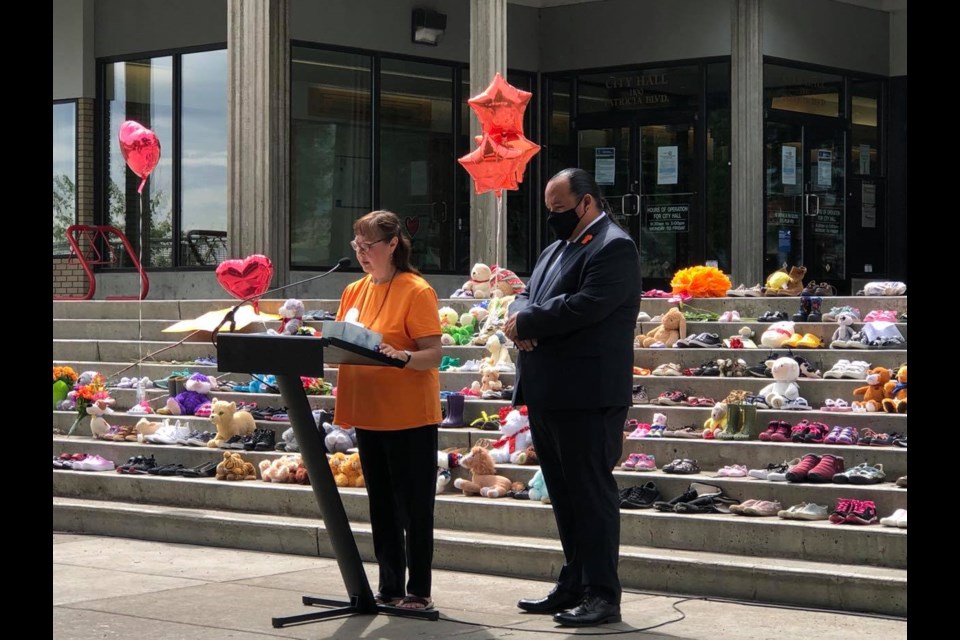It was an emotional ceremony as the Lheidli T’enneh lowered its flag in front of Prince George city hall, next to a memorial of shoes and teddy bears placed on the steps in honour of the 215 children discovered buried at the site of the former Kamloops Residential School.
Lheidli T’enneh Chief Dolleen Logan gathered with councillors, elders and supporters along with city officials in front of a large crowd assembled in front of city hall for today’s ceremony (June 1).
Elder Darlene McIntosh began the ceremony with a heartfelt opening prayer.
“This week marks an unforgiveable tragedy in the lives of our First Nations families. The shock of hearing of 215 children buried on Kamloops Residential School grounds has first nations and non-first Nations reeling in deep sorrow. The families that never knew what happened to their loved ones as it left deep wounds in their hearts,” says McIntosh.
“We hear the cries of our little ones as they died alone without the comfort of their families surrounding them with love. Creator, this is so painful. Our hearts are bleeding. We come together as a community, as a nation.”
Chief Logan also spoke before the flag lowering, remarking that there were a lot of Lheidli members who attended Lejac Residential School, in Fraser Lake, in attendance.
“I’ve heard what happened, some of what happened to my mom, my aunts, my uncles and our friends. They are the true survivors. They are the ones that made it home when so many didn’t,’ said Chief Logan.
“That word survivors should never be attached to a child attending school. I encourage everyone to continue talking about residential school because it actually happened to little children. Don’t ever stop the conversation.”
Chief Logan also called for the federal government to use the ground-penetrating radar used to discover the remains in Kamloops on every residential school site in Canada.
Mayor Lyn Hall echoed the sorrow of the occasion and the significance of the memorial on city hall steps in his speech.
“The shoes represent the little children who lost their lives at the residential school, a memory that we must never forget,” said Hall.
The Lheidli T’enneh flag was then lowered to half-mast at 12 p.m. in a moment of silence and it will remain lowered for the next 215 days as each day represents each child found.
After the flag was lowered, former Lheidli chief and current councillor Dominic Frederick gave a powerful speech to the crowd.
“Us that come from residential school were branded with survivor but it goes deeper than that. We were also branded with a number, mine was 22,” said Frederick. “No one - not one person can ever know or understand what we went through.”
Lheidli T’enneh councillor Crystal Gibbs said the May 27 discovery by Tk’emlúps te Secwépemc is just the beginning of a sad truth.
“My family like many others had members we were taken and never returned. Their strength their resilience and their memory is why we are still here,” Gibbs said. “I feel it’s very important to continue to teach our children and our grandchildren to be proud of where they come from and educate them. They need to have the ability to overcome and rise above the history that tried to erase them.”
Lheidli T’enneh councillor Joshua Seymour, whose grandfather attended Lejac Residential School, said Kamloops Residential School is just one of 140 across Canada.
“The last school closed in 1996 many of us could have went to that school that is how real it is. It is not in the past it is living history right now and this is where I feel that I agree with Chief Dolleen Logan when she says the federal government needs to put resources in to find those lost babies because those babies won’t rest and neither should we.”
“The discovery in Kamloops is a crime scene,” Joe Gosnell, Lheidli T’enneh executive director, added later. “Each residential school site in Canada should be considered a crime scene.”
The Lheidli T’enneh flag will not be raised again until January 2, 2022.
The ceremony concluded with time for elders to share their stories, drumming and singing.
A national Indian Residential School Crisis Line has been set up to provide support for residential school students and their families. If you are in need of counselling or support call the 24-hour national crisis line at 1-866-925-4419.








